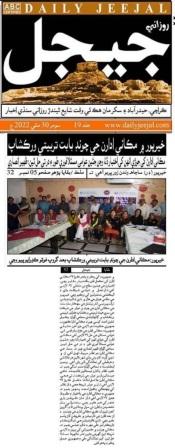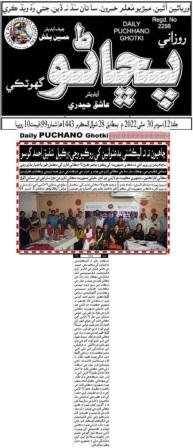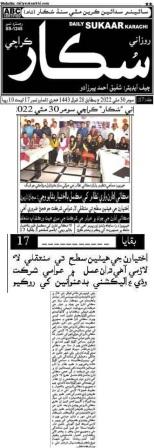- Home
- Capacity Building Workshop on Local Governance: 2022
Capacity Building Workshop on Local Governance
Workshop: Capacity Building Workshop on Local Governance: Enhancing Community Participation in Preparation for Local Government Elections in Sindh.
Date: May 29, 2022
Venue: Cafe Al Manzar Restaurant, Khairpur
Transparency international Pakistan in collaboration with NARI Foundation, Sukkur organized one day capacity building workshop on “Local Governance: Enhancing Community Participation for Local Government Elections in Sindh” in District Khairpur, Sindh. The objective of the training was to enhance community participation for local government elections, and to develop understanding about anti-corruption mechanisms among local government officials and community leaders contesting in local government elections in Sindh. The workshop was attended by 39 participants including 25 male and 14 female participants.
The event formally started at 10.00am with the recitation of the verses from the Holy Quran. Thereafter, participants introduced themselves. The workshop attendees hailed from different walks of life and included: Candidates for the election of Councilors, Journalists, Women Rights Activists, local government officials and legal experts.
Ms. Shazia Abbasi, Program Officer NARI Foundation provided a detailed overview of Transparency International Pakistan and NARI Foundation and highlighted key objectives of the workshop.
Next, Mr. Shafique Ahmed Khoso, Advocate Sindh High Court discussed in detail the topic of “Democracy, Decentralization and the Need for Effective Local Governments in Pakistan”. He emphasized that democracy and democratic process is the best way to empower communities at the grassroots level. In essence, democracy ensures that the fundamental rights of people are protected and citizens and communities are able to connect with their elected representatives through elections. He highlighted that after 18th Constitutional Amendment to the Constitution of Pakistan, local governance at the grassroots through local government elections, are now key part of Pakistan’s democratic process. This means that the representatives of local government, who live within communities, can be accessed easily and can play their role to resolve some of the basic problems of communities. He encouraged participants to create awareness and encourage more and more people to take part in the political activities at the local level.
Moving on, Mr. Shakeel Ahmed, Member Human Rights Forum Khairpur, Sindh gave a detailed presentation on ‘Silent Features of Sindh Local Government System’. He highlighted that significant powers have been delegated to the provinces post 18th Amendment to Pakistan’s constitution, ratified in 2010. In response, Khyber Pakhtunkhwa (KP) and Punjab provinces adopted new Local Government Acts (LGAs) by the end of 2013. As a result, several governmental functions have now been delegated to the sub-district or township level in response to the new legislation.
He also briefed the participants regarding key challenges faced by local government in Sindh. He argued that local governments work in the backdrop of low revenue and regular budget deficit, thus unable to provide effective delivery of critical public services. He argued that there is a greater reluctance at the provincial level for the fiscal and power decentralization to the local level. Similarly, citizens’ political participation in municipal administration is also highly restricted. He said that once the local government is established, people should have a check on how their local government is functioning. It includes the budget they spend, and the work they do for people. He said that this is called social accountability. He also informed the participants that Right to Information is an important social accountability tool which citizens can use to check performance of local government.
Next, Ms. Aisha Khan, Advocate Sindh High Court spoke about the “Need to Enhance Community Participation During Local Government Elections”. She emphasized that the communities must come to be part of the projects / programs and activities within union committees focusing on elections.
The last speaker was Ms. Khalida Riaz, Women Political Activist who conducted interactive session on the topic of “Ways to Eliminate Corrupt Practices During Local Government Elections”. She informed the participants about the pre-poll riggings which included changing of vote, manipulating constituencies, and the practice of buying votes. She informed how political parties deviate from their election manifestos, and there is no check and balance. During the interactive session, participants also presented their views on the need for anti-corruption mechanism in local government system.
In the end, Q/A session was held in which participants asked questions about democratic process, functions and structure of local governments, transformation of the resource to local level, problems faced by councilors and how these problems can be resolved within the ambit of local government laws. A female participant, Ms. Sajida asked about community participation methods particularly by women activists in the committees and sub committees of the union councils.
Participants thanked TI Pakistan for organizing the workshop and an opportunity to learn about the local government in Sindh. The event was followed by lunch.




